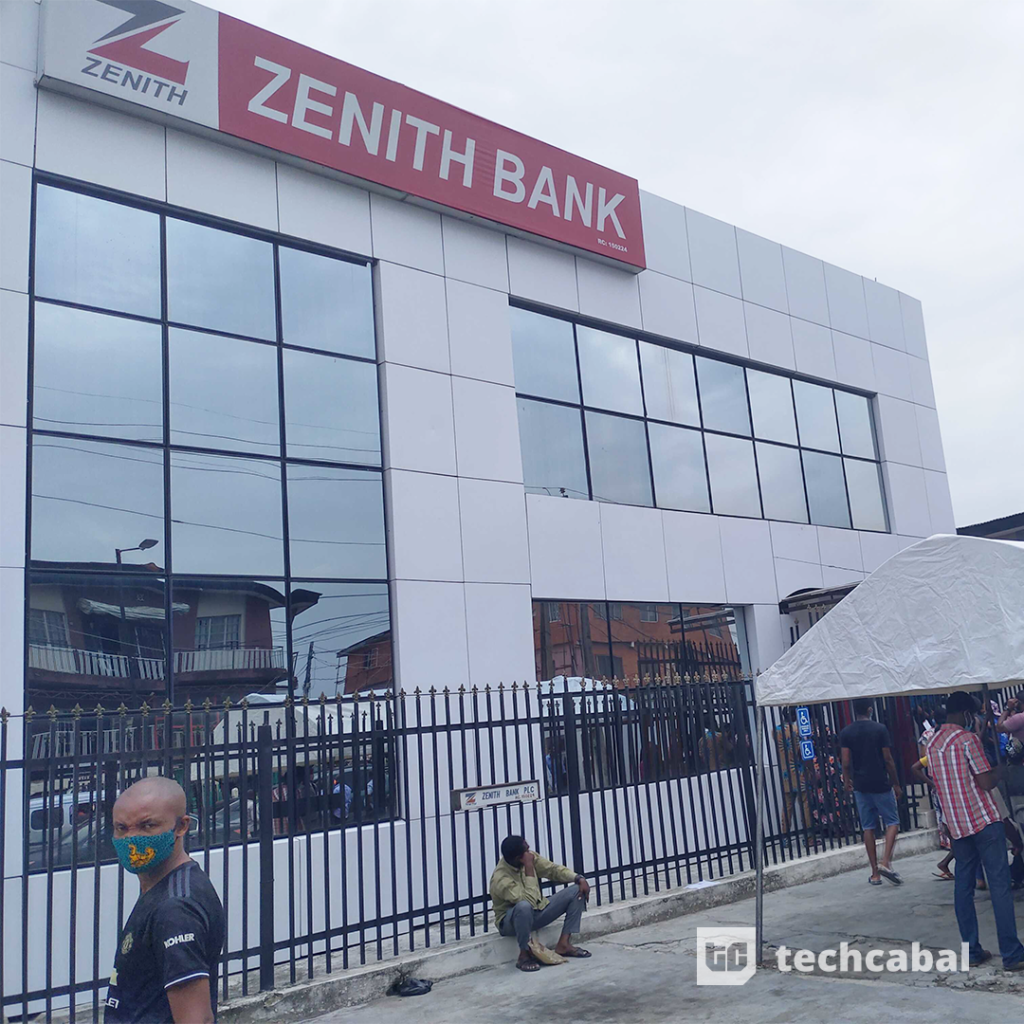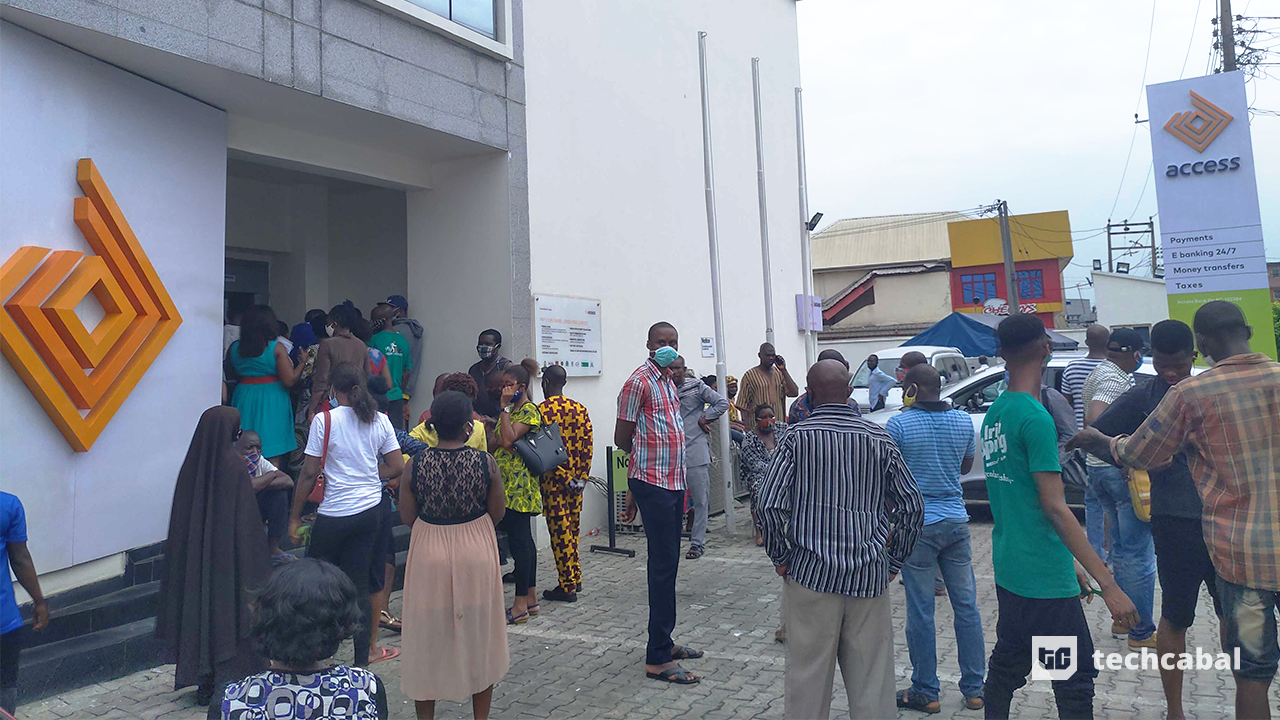Emmanuel has waited for more than two hours outside a Zenith Bank branch in Surulere, Lagos state. His ATM card expired before the five-week lockdown began on March 30. Unable to renew it, he had withdrawn enough cash to last the period.
But after now “surviving” the five weeks, he needs to withdraw more to enable him meet post-lockdown responsibilities.
“I cannot go to work without boarding a bus, and paying transport fare,” he tells me. The cash will enable him go to work, and get more money to feed himself and family.
He is seated by a pavement within the bank’s premises. A canopy is set up for about fifty other customers. Many are scurrying to skip queues and get into the hall before the branch closes for the day.
Chaos at bank premises
According to the Lagos state government’s guidelines, banks are to operate with a maximum of 60% of their staff strength and only open from 9am to 3pm.
But that directive may not have factored in a surge in bank visits on the first day after lockdown.
As the gradual easing of movement began this Monday, hundreds of bank customers stormed banking halls across Lagos. Their needs varied: while some needed cash, others apparently had complaints that needed to be addressed by humans interacting face-to-face.

The consequence was huge gatherings at several branches. It diminishes the hope that residents will continue to abide by social distancing guidelines even as the coronavirus remains a threat.
Already, some fear another lockdown is imminent.
Mayowa Orina, who works in Abuja but returned to Lagos before lockdowns began, was at an Access bank branch in Fadeyi, a Lagos suburb, as early as 8am.
“I went early because I’m scared the government might call for another lockdown seeing the way cases are increasing,” he tells me. “But I saw a lot who came to withdraw ₦20,000 ($51), do bank transfer, and a lot of things they could easily do on their phone.”
Digital payments boom? Not quite
Mobile money adoption in West Africa grew significantly in 2019. There were 14.5% more registered accounts than in 2018 and transaction value grew by 34.9%. Also, there are now more live mobile money services offered in West Africa (59) than in any other region in the world.
[Read: West Africa is mobile money’s rising star]
But as with most countries in sub-Saharan Africa, cash remains king in Nigeria where 60% of the country’s 114 million adults are unbanked.
Even with the presence of agent-based fintechs like Paga which offers wallets for digital transactions, the infrastructure and social consciousness to drive a digital economy remains below expectation.
While major aspects of the formal economy accept digital payments, cash-based transactions makeup huge chunks of daily exchange for most people in transportation, and in food markets.
For many hairdressers and barbers, shoe makers, and vulcanizers, cash remains the trusted and more convenient means of payments.
“I know what I’ve suffered from the first round of the lockdown.” Nonso Ezebuiro, a Lagos resident tells me. “I’ll be foolish to be unprepared for the next one.”
Despite having funds and bank apps for his three accounts, he had to borrow cash from his brother to buy essential items during the lockdown. Small shops and some supermarkets could not take mobile money payments from him.
In situations like this, it is just as important for merchants to be inclined to accept digital transactions as it is for upwardly mobile consumers of digital finance tech products, Ezebuiro says.
The poverty factor
Amidst the ‘digital’ conversation, it is worth bearing in mind that 40.1% of Nigerians – roughly 82.9 million people – live in poverty, according to the most recent data by the Nigerian Bureau of Statistics published today. Lagos has the lowest rate at 4.5%, which is at least a million people.
Nigeria’s poverty line is ₦137,430 ($352.84) a year, per the NBS. That translates to under ₦12,000 ($30.8) a month, hardly enough to maintain a lifestyle that affords the data subscription required for digital banking. The average price of 1GB of mobile data in Nigeria is about $2.22.
[Read: Why is Africa still a 2G continent?]
The large crowds that still find the need to flock to physical bank halls highlight the slow pace of digital banking adoption in Nigeria. Not just for payments and money transfers, but for customer care and dispute resolution.
At another Access bank branch, *Ibukun has come to upgrade her account. During the lockdown period, she received an unusually high (though legitimate, she says) amount of money into her account.
The bank blocked her account but efforts to resolve the situation by contacting them on Facebook and via helplines were unsuccessful. She was asked to visit a bank branch to have her complaints rectified.
The bank closed by 2pm, leaving many like Ibukun waiting outside with their complaints unresolved. Such experiences leave scars on the populace, increasing anxiety for future events of this type.
On the other hand, it shows that banks must expand their digital offerings to limit the need for physical interaction between customers and staff to the most essential matters.
What next?
This has just been Day One. While there’s a rush to get into bank halls, the population at ATMs remains largely similar to during the lockdown.
At one bank, the security guard prevents customers who are not wearing nose masks from entering the premises.
On Tuesday, banks are set to open their halls again for the second day post-lockdown.
A security guard tells a woman who has been unable to go into a banking hall to come as early as 8am, though the hall will open by 9am. But another person vows to be on site by 5:30am.
*Real name withheld to protect identity



















